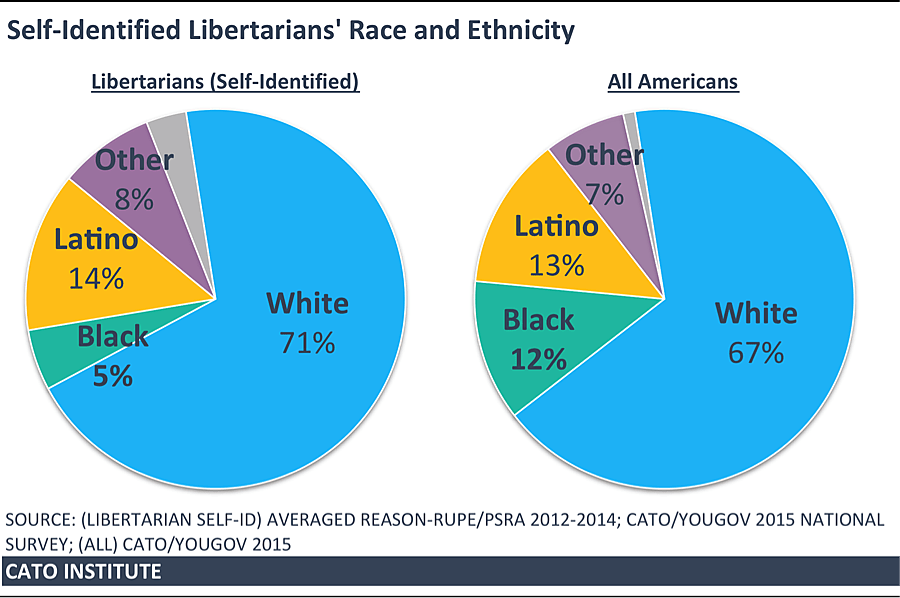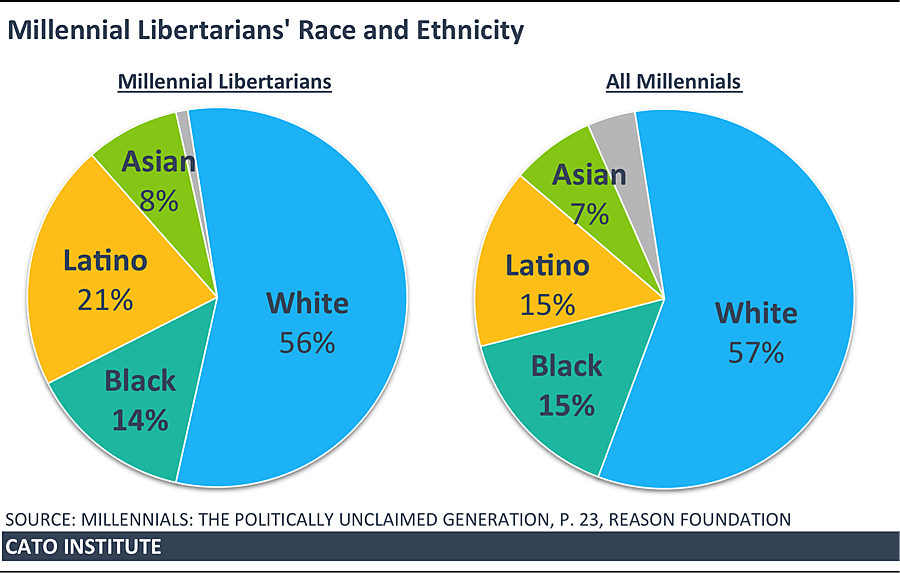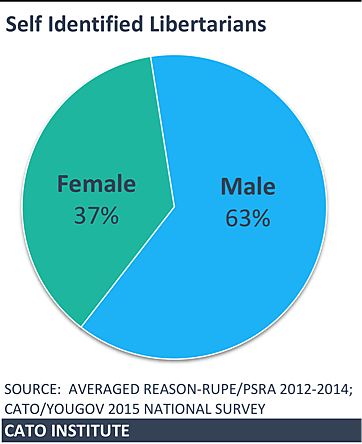In recent weeks, Libertarian presidential candidate Gary Johnson has been gaining media momentum as polls show him garnering about 10 percent of the vote in a race with Trump and Clinton. His candidacy has attracted attention to the libertarian ideas he espouses and the people who embrace the label.
The popular media stereotype of libertarians is disproportionately white and male. But is this accurate? What do the data actually say?
As it turns out, the libertarian label is embraced by a more racially and ethnically diverse group of individuals than some may realize, but tilts male.
Averaging across nine Reason-Rupe surveys I conducted at Reason Foundation/Reason Magazine with Princeton Survey Research Associates between 2012–2014 and a recent survey we conducted here at the Cato Institute with YouGov, here’s what we find: Among those who self-identify as “libertarian”, 71 percent are Caucasian, 14 percent are Latino, 5 percent are African-American, 8 percent identify as another race, and 4 percent chose not to identify. While not an exact reflection, these numbers are similar to the demographic makeup of all respondents averaged across the surveys: 67 percent white, 13 percent Latino, 12 percent African-American , 7 percent identifying as other, and 1 percent not identifying.
Both the Pew Research Center and YouGov have each respectively found similar results. YouGov found 16 percent of whites, 17 percent of Hispanics, and 10 percent of African-Americans agreed they would describe themselves as libertarian. Pew went a step further to see how many Americans embraced the label and also thought it meant “someone whose political views emphasize individual freedom by limiting the role of government.” Indeed, Latinos (11 percent) were as likely as Caucasians (12 percent) to say the word “libertarian” describes them well and agree the term means limited government. African-Americans were less likely to both self-identify as libertarian and also say the term means limited government (3 percent).
While some surveys may find a higher percentage of white libertarians, the benefit of this analysis is averaging across multiple surveys and thus we’re less reliant on the potential error in one survey.
Millennial Libertarians
Diversity increases further among millennial libertarians, reflecting the racial composition of the entire generation. In a study I conducted of millennials at Reason, we found (see pg. 23) that millennial libertarians reflect the racial/ethnic diversity of the national sample. (YouGov fielded the survey of 2000 18–29 year olds). Among millennials who self-identify as libertarian, 56 percent are white, 21 percent are Latino, 14 percent are African-American, 8 percent are Asian, and 1 percent identify as another race. This is similar to all millennials surveyed: 57 percent white, 15 percent African-American, 15 percent Latino, 7 percent Asian, and 4 percent as another race.
Gender
Although libertarians are more racially and ethnically diverse than is usually thought, they do lean more male than female. Averaging across the nine Reason-Rupe surveys and a Cato/YouGov survey between 2012–2015, 63 percent of self-identified libertarians are male and 37 percent are female. We found a similar ratio among millennial libertarians with them being 68 percent male and 32 percent female.
Similarly Pew found that men (15 percent) were about twice as likely as women (7 percent) to self identify as libertarian and say that the term means limited government. YouGov found a similar ratio between men and women with 21 percent of men saying they would describe themselves as libertarian as would 10 percent of women.
In sum, Americans who choose to self-identify as libertarian in surveys tend to reflect the racial and ethnic demography of the United States more than is commonly realized, particularly among younger libertarians. However, self-identified libertarians are more like to be male than female.



